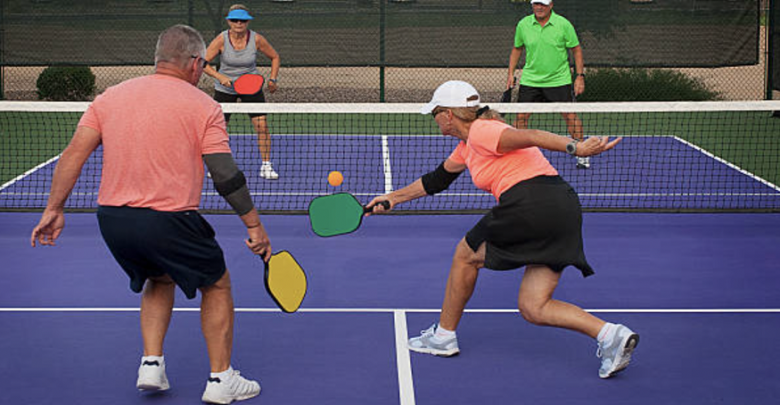Pickleball Etiquette: Best Practices for Respectful and Fair Gameplay

Pickleball is an inclusive, fast-growing sport that is well liked for its fun gameplay and welcoming community. Players are encouraged to respect, sportsmanship, and fair play by adhering to a set of best practices and etiquette guidelines. Pickleball etiquette is important for players of all abilities and backgrounds to understand and follow because it fosters a friendly, encouraging environment that encourages friendship, respect, and a fun gaming experience for all players. We examine the fundamental ideas and recommended procedures of Pickleball etiquette in this extensive guide, emphasizing the important components that go into creating a welcoming and polite Pickleball community.
Read more: The Pros and Cons of Online Shopping
Embracing Sportsmanship and Respect
Pickleball etiquette is based on sportsmanship and respect and emphasizes fair play, polite conduct, and cordial interactions between players on and off the court. Players can foster a healthy and inclusive environment that emphasizes integrity, empathy, and mutual admiration for the sport and its participants by adopting sportsmanship and respect.
Demonstrating Good Sportsmanship
Being courteous during games exchanges, having a pleasant mood, and recognizing the accomplishments of opponents are all examples of excellent sportsmanship in Pickleball. Players can demonstrate good sportsmanship by following the laws and regulations of the game, giving opponents credit for well-executed shots, and acting with respect and positivity no matter how the match turns out.
Respecting Opponents and Partners
Respecting Pickleball partners and opponents means behaving with grace, decency, and thoughtfulness. It also promotes a cooperative and respectful environment that makes Pickleball more enjoyable for all players. Effective communication, appreciating their partners’ efforts, and upholding a kind and encouraging demeanor that fosters cooperation and teamwork on the court are all ways that players can show respect for one another.
Following Court Etiquette Guidelines
Following the rules of court etiquette is crucial for encouraging equitable and well-organized play, guaranteeing that Pickleball matches may take place in a setting that is secure, courteous, and favorable to play. Players can create a seamless and joyful gaming experience for themselves and their fellow players by adhering to court etiquette rules, which will strengthen the sense of community and togetherness among Pickleball players.
Observing Proper Court Entry and Exit Procedures
Respecting players’ privacy and concentration during matches, leaving the court on time, and refraining from disruptive activities that could disrupt the game are all part of adhering to the correct court entry and exit protocols. In order to prevent distractions that could impair their focus and performance on the court, players should respect the specified entry and leave points, wait patiently for their turn, and behave quietly.
Communicating Effectively with Partners and Opponents
In Pickleball, coordination, synergy, and mutual understanding are fostered by effective communication between players and opponents throughout games exchanges. It is imperative that players communicate with their opponents and partners in a clear, succinct, and courteous manner to keep everyone informed, involved, and coordinated with the strategic goals and gameplay strategies being used in the battle.
FAQs
1. What should players do if they accidentally interfere with an opponent’s shot during a Pickleball match?
In order to maintain fair and equitable play for both teams, players who unintentionally obstruct an opponent’s shot should accept responsibility for their actions, extend their heartfelt apologies, and permit the point to be replayed.
2. How can players maintain a positive and respectful attitude when facing challenging opponents during a Pickleball match?
When playing against tough opponents, players can keep a cool head under pressure, concentrate on their own gameplay tactics, and graciously and sportsmanship acknowledge their opponents’ abilities and efforts.
3. What are the key considerations for players when engaging in post-match interactions and discussions with opponents and partners?
Players should approach their interactions and conversations with opponents and partners following a game with openness, empathy, and respect for one another. They should also engage in constructive dialogue, offer constructive criticism, and show gratitude for the chance to compete in a welcoming environment.
4. How does Pickleball etiquette contribute to the overall development of a positive and vibrant Pickleball community, and what role does it play in fostering lasting friendships and connections among players?
By encouraging a culture of inclusivity, friendship, and support among players, Pickleball etiquette helps to build a positive and vibrant Pickleball community overall. It also fosters meaningful connections and long-lasting friendships that go beyond the confines of the game and give participants a sense of unity and belonging.
5. What steps can players take to encourage adherence to Pickleball etiquette standards among their peers and fellow community members?
By setting an example, teaching others the value of fair and courteous play, and fostering a culture of sportsmanship, integrity, and respect for one another that embodies the ideals and principles of the Pickleball community, players can actively encourage their peers and fellow community members to adhere to Pickleball etiquette standards.
6. How does Pickleball etiquette contribute to the overall enjoyment and satisfaction of the sport for players of all skill levels and backgrounds?
By promoting an environment of inclusivity, fairness, and positive interactions that enhance the overall gameplay experience and create a welcoming and supportive atmosphere for participants to develop their skills, forge meaningful connections, and celebrate the spirit of Pickleball, Pickleball etiquette helps players of all skill levels and backgrounds enjoy and be satisfied with the sport overall.
7. What are some common etiquette mistakes that players should avoid during Pickleball matches, and how can they prevent such errors from occurring?
Common etiquette errors that players should avoid during Pickleball matches include acting unsportsmanlike, communicating poorly with teammates and opponents, and disobeying the game’s rules. By following Pickleball etiquette principles, being a good sportsman, and always treating other players with respect and concern, players can avoid making such mistakes.
Conclusion
A flourishing and dynamic Pickleball community is built on a foundation of Pickleball etiquette, which promotes a culture of fair play, sportsmanship, and respect that enhances the entire gameplay experience and fortifies player relationships. Players can foster a positive and inclusive Pickleball environment that values integrity, camaraderie, and mutual support, fostering a sense of belonging and unity that extends beyond the confines of the game, by adhering to the principles of good sportsmanship, effective communication, and respectful behavior. Future generations of Pickleball players and enthusiasts will be left with an enduring legacy of sportsmanship and camaraderie as long as players uphold the spirit of Pickleball etiquette. Through forming enduring friendships, nurturing meaningful connections, and creating memorable experiences, players can contribute to the values and traditions of the Pickleball community.
